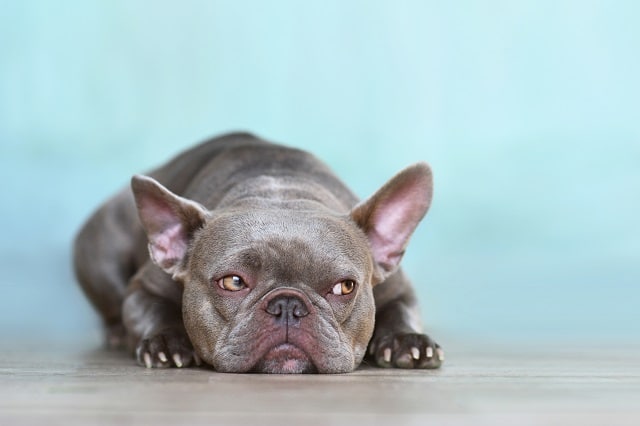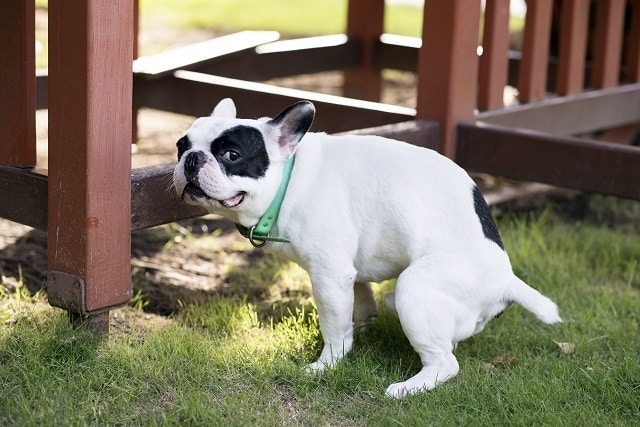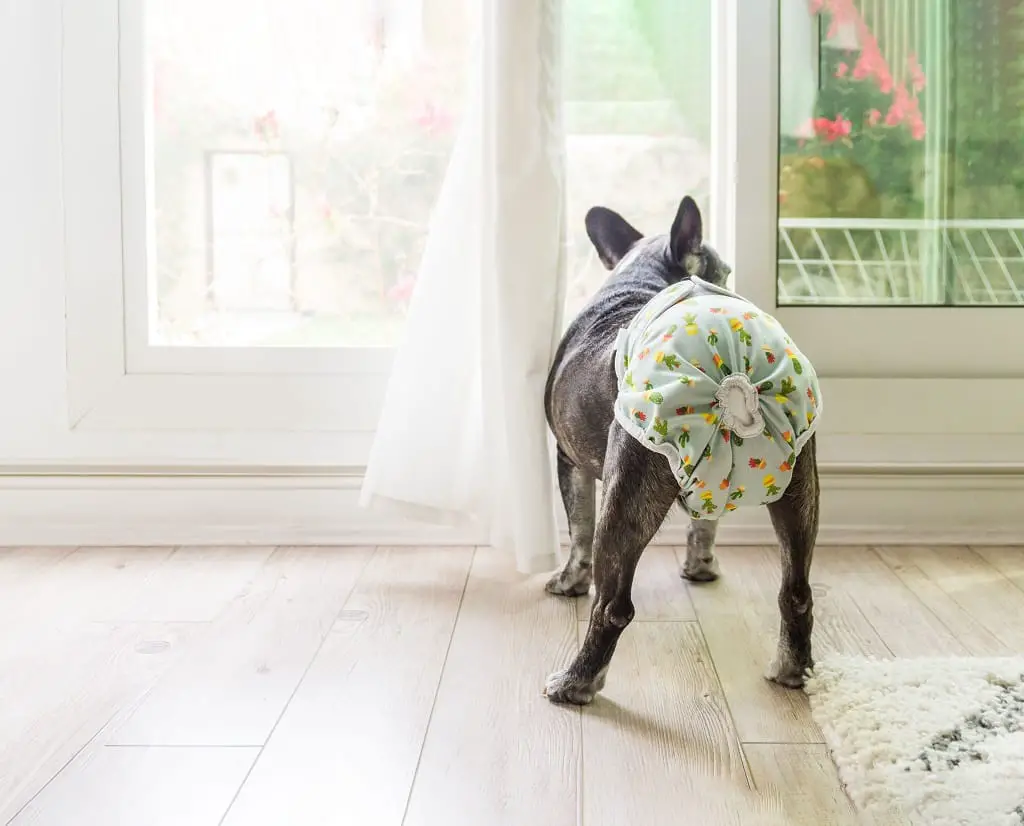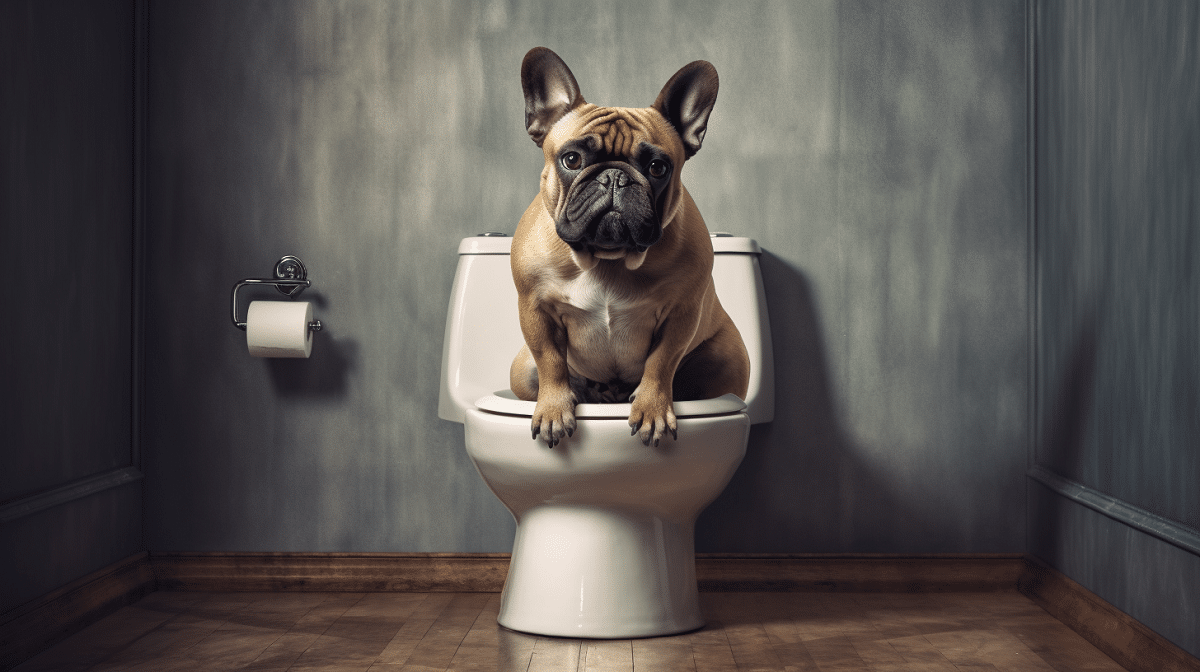Diarrhea in French Bulldogs, like in any other dog breed, is characterized by loose, watery, or unformed stools. This condition can vary in severity, duration, and frequency, depending on the underlying cause. It’s important to understand the difference between occasional diarrhea and chronic diarrhea, as each may require a different approach to treatment.
Occasional diarrhea is generally short-lived and can be triggered by a temporary issue such as a dietary indiscretion or mild gastrointestinal upset. In most cases, this type of diarrhea will resolve on its own or with minimal intervention. On the other hand, chronic diarrhea persists for an extended period or recurs frequently, often indicating a more serious underlying problem that requires veterinary attention.
Determining the underlying cause of diarrhea is crucial for effective treatment, as each case may necessitate a unique approach. Some cases of diarrhea can be managed at home with simple care and dietary changes, while others may require more intensive veterinary intervention. It’s essential to be attentive to your French Bulldog’s symptoms and overall health, as this will help guide your decisions regarding treatment and when to seek professional assistance.
In the following sections, we will discuss the various causes of French Bulldog diarrhea, as well as preventive measures that can help keep your dog’s digestive system running smoothly. We will also explore how to recognize symptoms that may warrant veterinary attention and the range of treatment options available for managing this condition. By developing a better understanding of French Bulldog diarrhea, you’ll be better equipped to support your pet’s health and well-being, ensuring they remain happy and comfortable throughout their life.
Understanding French Bulldog Diarrhea
Diarrhea in French Bulldogs, like in any other dog breed, is characterized by loose, watery, or unformed stools. This common health issue can vary in severity, duration, and frequency, depending on the underlying cause. It’s essential for French Bulldog owners to understand the difference between occasional diarrhea and chronic diarrhea, as each may require a different approach to treatment.
Occasional diarrhea in French Bulldogs is generally short-lived and can be triggered by a temporary issue such as a dietary indiscretion or mild gastrointestinal upset. In most cases, this type of diarrhea will resolve on its own or with minimal intervention. On the other hand, chronic diarrhea persists for an extended period or recurs frequently, often indicating a more serious underlying problem that requires veterinary attention.
Determining the underlying cause of diarrhea in French Bulldogs is crucial for effective treatment, as each cause may necessitate a unique approach. Some cases of French Bulldog diarrhea can be managed at home with simple care and dietary changes, while others may require more intensive veterinary intervention. It’s essential to be attentive to your French Bulldog’s symptoms and overall health, as this will help guide your decisions regarding treatment and when to seek professional assistance.
In the following sections, we will discuss the various causes of French Bulldog diarrhea, as well as preventive measures that can help keep your dog’s digestive system running smoothly. We will also explore how to recognize symptoms that may warrant veterinary attention and the range of treatment options available for managing this condition in French Bulldogs. By developing a better understanding of French Bulldog diarrhea, you’ll be better equipped to support your pet’s health and well-being, ensuring they remain happy and comfortable throughout their life.

Causes of French Bulldog Diarrhea
Understanding the various causes of diarrhea in French Bulldogs is essential for addressing the issue effectively. Diarrhea can result from several factors, some of which are more common than others. Here, we will discuss the most prevalent causes of French Bulldog diarrhea and how they impact your dog’s health.
- Dietary issues: Sudden changes in your French Bulldog’s diet, food sensitivities, and allergies can all contribute to diarrhea. Introducing new foods too quickly or feeding your dog food that is difficult for them to digest can disrupt their gastrointestinal system, leading to loose stools.
- Bacterial and viral infections: Common pathogens, such as Salmonella, Campylobacter, and canine parvovirus, can cause diarrhea in French Bulldogs. These infections may result from contaminated food, contact with infected animals, or exposure to unclean environments.
- Intestinal parasites: Worms, such as roundworms, hookworms, and whipworms, can infest a French Bulldog’s digestive tract and cause diarrhea. These parasites often enter a dog’s system through ingestion of contaminated soil, water, or feces.
- Stress and anxiety: Emotional well-being can have a significant impact on a French Bulldog’s bowel movements. Stressful situations, such as changes in routine, unfamiliar environments, or loud noises, can trigger diarrhea in sensitive dogs.
- Other potential factors: Medications, toxins, and underlying health conditions, such as inflammatory bowel disease or pancreatitis, can also cause diarrhea in French Bulldogs. It’s important to be aware of any changes in your dog’s health and consult with a veterinarian if you have concerns.
By identifying the cause of your French Bulldog’s diarrhea, you can take the appropriate steps to manage the issue and prevent future episodes. In the next section, we will discuss preventive measures that can help maintain your dog’s digestive health and reduce the risk of diarrhea.
Preventive Measures
To keep your French Bulldog’s digestive system healthy and reduce the risk of diarrhea, it’s important to implement preventive measures. By being proactive, you can help maintain your dog’s well-being and avoid potential health issues. Here are some key preventive measures you can take:
- Maintaining a balanced and appropriate diet: Choosing the right food for your French Bulldog is crucial. Opt for high-quality, easily digestible dog food that is tailored to your dog’s specific needs, such as age, size, and activity level. Avoid feeding table scraps or foods known to trigger allergies or sensitivities. When transitioning to a new diet, do so gradually, mixing the new food with the old food over several days to prevent sudden changes that could cause diarrhea.
- Hygiene and cleanliness: A clean living environment is essential for preventing the spread of infections and parasites that can cause diarrhea in French Bulldogs. Regularly clean and disinfect your dog’s living area, food and water bowls, and toys. Additionally, practice proper food handling and storage to reduce the risk of bacterial contamination.
- Regular veterinary check-ups: Routine examinations and preventive treatments play a vital role in maintaining your French Bulldog’s health. Regular visits to your veterinarian will help identify any potential issues early, allowing for prompt treatment and management. Your vet can also recommend appropriate vaccinations, deworming schedules, and other preventive measures tailored to your dog’s specific needs.
- Stress management: Creating a stress-free environment for your French Bulldog can help reduce the likelihood of stress-induced diarrhea. Provide a comfortable, quiet space for your dog to rest, and establish a consistent routine that includes regular exercise and mental stimulation. If your dog is prone to anxiety, consider seeking advice from a veterinarian or professional trainer to help with behavior modification techniques.
- Identifying Symptoms and Seeking Veterinary Assistance (Word Count: 300-400) Recognizing signs of French Bulldog diarrhea: Changes in stool appearance, frequency, and color, as well as accompanying symptoms, can provide valuable information about your dog’s health. Be attentive to any unusual changes, such as watery or bloody stools, increased frequency, or straining during bowel movements.
- Identifying accompanying symptoms: In addition to changes in stool, keep an eye out for other symptoms that may indicate a more serious issue, such as vomiting, loss of appetite, weight loss, lethargy, or signs of dehydration (sunken eyes, dry gums, and skin tenting).
- When to seek veterinary assistance: If your French Bulldog’s diarrhea persists for more than a day or two, is accompanied by severe symptoms, or if you have concerns about their overall health, it’s important to consult with a veterinarian. They can perform a thorough examination, recommend diagnostic tests, and prescribe appropriate treatment to address the underlying cause of diarrhea.
By implementing these preventive measures and staying vigilant about your French Bulldog’s health, you can reduce the risk of diarrhea and ensure your pet remains happy and healthy. In the following sections, we will discuss treatment options for French Bulldog diarrhea and answer some frequently asked questions related to this common health issue.

Treatment Options
If your French Bulldog is experiencing diarrhea, it’s important to address the issue promptly to prevent dehydration and further complications. Depending on the cause and severity of the diarrhea, various treatment options may be recommended by your veterinarian. Here are some common treatment approaches for French Bulldog diarrhea:
- Fluid and electrolyte balance: Ensuring your French Bulldog stays hydrated is crucial during episodes of diarrhea, as they can lose significant amounts of fluids and electrolytes. Encourage your dog to drink water regularly and consider offering a rehydration solution, such as an unflavored pediatric electrolyte drink, to help replace lost electrolytes. Consult with your veterinarian for specific recommendations.
- Dietary modifications: During an episode of diarrhea, your veterinarian may recommend feeding your French Bulldog a bland diet that is easy to digest. Foods like boiled white rice and boiled boneless, skinless chicken can help soothe the gastrointestinal tract and reduce the severity of diarrhea. Once the diarrhea has subsided, gradually reintroduce your dog’s regular diet over a few days.
- Probiotics: Probiotics can be beneficial in restoring your French Bulldog’s gut health and improving digestion. These beneficial bacteria can help maintain a healthy balance of microorganisms in the digestive tract and may alleviate diarrhea caused by an imbalance. Consult with your veterinarian for specific probiotic recommendations and dosages.
- Medications: In some cases, medications may be necessary to treat the underlying cause of diarrhea in French Bulldogs. Antibiotics may be prescribed for bacterial infections, antiparasitic drugs for intestinal parasites, and anti-inflammatory medications for conditions like inflammatory bowel disease. Always follow your veterinarian’s instructions and complete the full course of prescribed medications, even if your dog’s symptoms improve before the medication is finished.
- Stress reduction techniques: If stress or anxiety is contributing to your French Bulldog’s diarrhea, it’s important to create a calm and soothing environment for your pet. Consider using pheromone diffusers, calming music, or a comfortable and secure den to help your dog feel more at ease. If necessary, consult with a veterinarian or professional trainer for behavior modification techniques to reduce anxiety.
- Importance of following veterinarian’s instructions and guidance: Remember that each case of diarrhea is unique, and it’s crucial to follow your veterinarian’s recommendations for treatment. They will tailor their advice to your French Bulldog’s specific needs and monitor their progress throughout the treatment process.
By understanding the various treatment options available for French Bulldog diarrhea, you can better support your pet’s recovery and well-being. In the next section, we will address some frequently asked questions about French Bulldog diarrhea, offering further guidance and insights to help you care for your pet.
Frequently Asked Questions
In this section, we’ll address some common questions related to French Bulldog diarrhea, offering guidance and insights to help you care for your pet effectively.
- What should I do if my French Bulldog has diarrhea?
If your French Bulldog has diarrhea, monitor their condition closely, ensuring they stay hydrated and offering a bland diet if necessary. If the diarrhea persists for more than a day or two, is accompanied by severe symptoms, or if you have concerns about their overall health, consult with a veterinarian for further evaluation and treatment.
- Can I give my French Bulldog over-the-counter medications for diarrhea?
It’s important to consult with a veterinarian before administering any over-the-counter medications for diarrhea, as some human medications may be harmful to dogs or may not address the underlying cause of the issue. Your veterinarian can recommend appropriate treatment options based on your French Bulldog’s specific needs.
- How can I prevent French Bulldog diarrhea during dietary changes?
To prevent diarrhea during dietary changes, introduce new foods gradually, mixing them with your dog’s current food over several days. This allows your French Bulldog’s digestive system to adjust to the new food without causing sudden disruptions that can lead to diarrhea.
- Are there any home remedies for mild cases of French Bulldog diarrhea?
For mild cases of diarrhea, offering a bland diet of boiled white rice and boiled boneless, skinless chicken can help soothe your French Bulldog’s gastrointestinal tract. Encourage your dog to drink water regularly to prevent dehydration, and consider adding a probiotic supplement to support gut health. However, always consult with a veterinarian if you have concerns about your dog’s health or if the diarrhea persists.
- How long does it take for French Bulldog diarrhea to resolve with treatment?
The duration of diarrhea can vary depending on the cause and severity of the issue. With appropriate treatment, mild cases of diarrhea may resolve within a day or two. More severe cases or those caused by underlying health conditions may take longer to resolve and require ongoing management under the guidance of a veterinarian.
- Should I be concerned if there is blood in my French Bulldog’s stool?
Blood in your French Bulldog’s stool can be a cause for concern, as it may indicate a more serious issue, such as an infection, inflammation, or injury to the gastrointestinal tract. If you notice blood in your dog’s stool, contact your veterinarian for further evaluation and treatment.
- Can stress and anxiety cause recurring episodes of French Bulldog diarrhea?
Yes, stress and anxiety can contribute to recurring episodes of diarrhea in French Bulldogs. Managing your dog’s stress and anxiety through a consistent routine, a calm environment, and appropriate behavior modification techniques can help reduce the risk of stress-induced diarrhea.
- Is French Bulldog diarrhea contagious to other dogs or humans?
Some causes of French Bulldog diarrhea, such as bacterial and viral infections or intestinal parasites, can be contagious to other dogs or, in some cases, humans. To reduce the risk of transmission, maintain a clean living environment, practice proper hygiene, and keep your French Bulldog away from other dogs or humans until they have fully recovered and your veterinarian confirms they are no longer contagious.
- What are the potential complications of untreated or chronic diarrhea in French Bulldogs?
Untreated or chronic diarrhea can lead to dehydration, electrolyte imbalances, weight loss, and malnutrition in French Bulldogs. Additionally, ongoing diarrhea may be indicative of a more serious underlying health condition that requires prompt attention and treatment.
- How can I help my French Bulldog recover and prevent future episodes of diarrhea?
To support your French Bulldog’s recovery and prevent future episodes of diarrhea, follow your veterinarian’s treatment recommendations, maintain a balanced and appropriate diet, ensure a clean living environment, and schedule regular veterinary check-ups for preventive care. Additionally, address any stress or anxiety triggers in your dog’s life, and consider using probiotics to support gut health.

Conclusion
In this comprehensive guide, we’ve explored the importance of addressing French Bulldog diarrhea, and understanding its causes, symptoms, and potential treatments. Diarrhea can have a significant impact on your dog’s health, making it essential to recognize the signs and seek veterinary assistance when necessary.
By taking preventive measures like maintaining a balanced diet, ensuring a clean living environment, and reducing stress, you can help minimize the risk of diarrhea in your French Bulldog. Remember that each dog is unique, and it’s crucial to follow your veterinarian’s guidance for personalized advice and treatment.
We hope this guide has provided valuable insights and information to help you care for your French Bulldog, ensuring their health and well-being. By staying informed and proactive, you can help your beloved pet enjoy a happy, healthy life free from the discomfort and complications of diarrhea.
References
PetMD. (2021). Diarrhea in Dogs: Causes, Symptoms, and Treatment. Retrieved from https://www.petmd.com/dog/conditions/digestive/c_dg_diarrhea_acute
American Kennel Club. (2020). Diarrhea in Dogs: Causes, Symptoms, and Treatments. Retrieved from https://www.akc.org/expert-advice/health/dog-diarrhea/
University of Wisconsin-Madison School of Veterinary Medicine. (n.d.). Diarrhea in Dogs. Retrieved from https://vetmed.wisc.edu/pet-owners/pet-health-topics/diarrhea-in-dogs/

